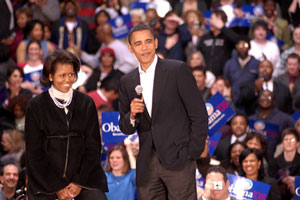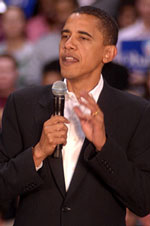ASKIAM
Senior Correspondent
Historic Obama win ushers in hope for change in America
- Excitement sweeps Black America and the world (FCN, 06-11-2008)
- Obama still standing after attacks by opponents (FCN, 05-14-2008)
- Sen. Barack Obama’s Big Win: Is America changing her attitude?(FCN, 01-14-2008)

WASHINGTON (FinalCall.com) – Sen. Barack Obama (D-Ill.) now appears destined to become the 2008 Democratic Party nominee for president of the United States. If elected Nov. 4, this son of a Kenyan economist father and a White American mother would be the first Black president.
In barbershops and on the boulevards, from Nashville, Tenn., to Nairobi, Kenya, there was near euphoria when the votes were counted from the final primaries in South Dakota and Montana, and a flood of Democratic National Committee “super delegates,” including the entire New York Democratic congressional delegation, joined the Obama bandwagon.
The fresh support from uncommitted super delegates and from those previously pledged to Sen. Hillary Clinton (D-N.Y.)–Sen. Obama’s principal rival–gave him more than enough delegates to receive the party’s nomination on the first ballot at its convention in Denver in late August.
“Tonight we mark the end of one historic journey with the beginning of another–a journey that will bring a new and better day to America,” Sen. Obama told supporters in St. Paul, Minn. June 3 as he claimed the nomination. “Because of you, tonight I can stand before you and say that I will be the Democratic nominee for president of the United States of America.”
Then, following a secretly arranged face-to-face meeting June 5 in the home of Sen. Diane Feinstein (D-Calif.), Sen. Clinton announced an end to her campaign and forcefully pledged her unqualified support for Sen. Obama, calling on her supporters to “take our energy, our passion, our strength, and do all we can to help elect Barack Obama the next president of the United States.
“Life is too short, time is too precious, and the stakes are too high to dwell on what might have been,” Sen. Clinton told a Washington rally June 7. “We have to work together for what still can be. And that is why I will work my heart out to make sure that Sen. Obama is our next president, and I hope and pray that all of you will join me in that effort,” said Sen. Clinton, who began the presidential campaign in early 2007 as the overwhelming favorite to win the nomination.
Sen. Clinton’s campaign was also an historic first for a woman. “Obviously, I am thrilled and honored to have Senator Clinton’s support,” Sen. Obama said in a statement following the Clinton concession speech. “But more than that, I honor her today for the valiant and historic campaign she has run. She shattered barriers on behalf of my daughters and women everywhere, who now know that there are no limits to their dreams,” he continued.
“Our party and our country are stronger because of the work she has done throughout her life, and I’m a better candidate for having had the privilege of competing with her in this campaign,” said Sen. Obama.
The historic aspect of the campaign and the Obama victory may have also helped to burnish the otherwise tarnished image of the U.S. and the policies of the administration of Republican President George W. Bush around the world.
In Kisumu, Kenya, near the home of Sen. Obama’s deceased father, people crowded around televisions to watch Sen. Obama’s victory speech, chanting “Obama Tosha!”–“Obama is enough!”
“I can’t express the joy in me,” said Sarah Obama, the senator’s grandmother at her home, according to published reports. “I’m only praying for more success in the coming days.”
While Sen. Obama continually stressed that his was not strictly a “Black campaign,” in the end it was Sen. Clinton’s withdrawal from the race before thousands of passionate supporters that most resembled the historic 1984 presidential campaign of the Rev. Jesse Jackson.
“What she tried to do is something we did successfully, and I think she has probably done it as successfully as she could, given her constituency and given the pressure on her,” said Dr. Ronald Walters, professor of political science at the University of Maryland and a senior campaign strategist in the Jackson 1984 and 1988 campaigns.
Just as the Clinton campaign demonstrated that a female candidate can successfully compete for a major party nomination, the Jackson campaigns had done that for Black candidates.
“We had to decide before we got to that moment, what we were doing,” said Dr. Walters. “That is, whether or not we were running a traditional campaign–which is to say, run for the nomination and the presidency–or whether or not it was the mixture of both, because we felt that we were carrying the hopes and dreams of Black people on our shoulders. We had to make the best of whatever political situation we found ourselves in.
“When we were beat up pretty bad in New York and Pennsylvania, we came out of there and the press was just hounding us to get out,” Dr. Walters continued. “I said, ‘Look. We have to decide for ourselves what winning is all about. We are in this and we’ve accumulated a number of political resources, so winning does not necessarily mean winning the nomination or the White House. For us and our history, winning means taking advantage of every mile you’ve walked,” said Dr. Walters.
Although many Congressional Black Caucus members had been supporters of Sen. Clinton, the organization’s leader said she was happy with the Obama victory. “This epic chapter in America’s history is remarkable,” CBC Chair Rep. Carolyn Cheeks-Kilpatrick said in a statement.
A political “nudge” which hastened Sen. Clinton’s withdrawal and full-throated support for the Obama campaign may have come from the 23-member New York Democratic delegation to Congress, led by Harlem Rep. Charles Rangel, who is chair of the House Ways and Means Committee. He is also considered by many to be Mrs. Clinton’s political mentor in the Empire State.
“We wanted to publicly state that it was a great campaign,” Rep. Rangel told reporters at the Democratic National Committee headquarters June 5. “We pledged to be with Sen. Clinton until the end, and this is the end,” said Mr. Rangel.

Sen. Obama began his historic campaign Feb. 10, 2007 in Springfield, in front of the Illinois state capitol where, in 1858, soon-to-become President Abraham Lincoln delivered his famous “House Divided” address, speaking out against slavery.
“In the face of a politics that’s shut you out, that’s told you to settle, that’s divided us for too long, you believe we can be one people, reaching for what’s possible, building that more perfect union,” Sen. Obama told the thousands who braved freezing early morning temperatures to attend the outdoor announcement.
“Sixteen months have passed since we first stood together on the steps of the Old State Capitol in Springfield, Ill. Thousands of miles have been traveled; millions of voices have been heard,” Sen. Obama told supporters in St. Paul June 3. “And because of what you said, because you decided that change must come to Washington, because you believed that this year must be different than all the rest, because you chose to listen not to your doubts or your fears, but to your greatest hopes and highest aspirations, tonight we mark the end of one historic journey with the beginning of another.”
Sen. Obama called the occasion of his victory a “defining moment” in U.S. history, and he reminded his supporters that their contributions and votes were vital to achieving his goal of changing the way the U.S. governs itself.
“You didn’t do that because of me or Senator Clinton or anyone else,” Sen. Obama continued. “You did it because you know in your hearts that at this moment, a moment that will define a generation, we cannot afford to keep doing what we’ve been doing. We owe our children a better future. We owe our country a better future. And for all those who dream of that future tonight, I say: Let us begin the work together. Let us unite in common effort to chart a new course for America.”
While many people will take time off this summer, Republican presidential nominee John McCain and Sen. Obama–and their underlings–will be working.
Working industriously on an election that only one can win.
With 11 weeks to the start of the Democratic convention–and the GOP event just days later–Sen. McCain (Ariz.) and Mr. Obama will be focused on strategy, fundraising, shoring up weak spots and exploiting opportunities to prepare themselves for the sprint to Nov. 4.
From now on, most Americans can be excused if they barely realize a presidential election is under way. They will see virtually no TV ads, visits by candidates or local news coverage.
That’s because this campaign, like the last two, will focus on about 15 competitive states. Both parties see the other states as reliably in their camps and not needing attention, or totally out of reach and not worth the effort and expense of trying to win them. In either case, these states will largely be ignored.
Sen. McCain will start by trying to hold the 31 states President Bush won in 2004 (which are almost identical to the 30 he won in 2000). If he succeeds, he will be president.
Sen. Obama must claim one or more of those states, while losing few if any of the ones Al Gore and John Kerry won in their narrow losses to Mr. Bush.
The magic number is 18. That’s how many electoral votes Mr. Obama must add to Mr. Kerry’s 252, from four years ago, to secure the presidency. For example, if Mr. Obama carries Iowa (seven electoral votes) and Missouri (11) without losing any Kerry states, he would become president.
(The Associated Press contributed to this report.)












